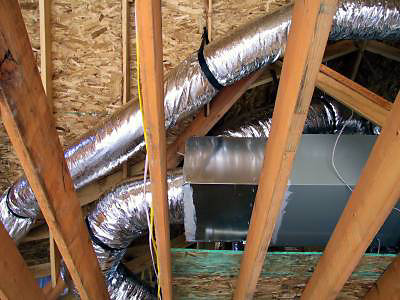Understanding Ductwork: Answering Your Most Commonly Asked Questions

January 03, 2012
An often overlooked, yet significant element in your home’s heating and cooling system is your ductwork.
Air ducts are responsible for distributing warmed and cooled air throughout your home, keeping you comfortable. Improperly designed or failing ductwork can cost you a great deal of money in energy loss and, in some instances, lead to a premature failure of your heating and cooling units.
We have collected some of the most frequently asked air duct related questions and posted them with our answers below.
Q. I hear that your ducts can leak. What does this mean?
A. Studies have shown that leaks in your ductwork are responsible for as much as 25% of energy loss inside your home. Air Ducts require a balance in pressure to evenly distribute heated or cooled air throughout your house. Gaps, dents, or loose seals can all allow air to escape into unconditioned areas. This imbalance of air pressure can make the job of your heater or air conditioner more difficult. Your unit has to work extra hard to make your home comfortable. Anytime you are heating or cooling unit has to perform overtime, you are sacrificing comfort while wasting energy and money.
Q. How can I tell if my ducts are leaking?
A. While there are several ways to tell if your air ducts are leaking, a telltale sign is often your level of comfort. If you find that you’re always running your cooling or heating unit and your home never seems to reach the desired temperature, or some rooms are more comfortable than others, your ductwork might be to blame. Moisture on the outside of ducts or spots on the ceiling are other signs of leaking ductwork. The best way to be certain is to contact a professional to help you accurately assess the condition and performance of your ductwork.
Q. If my ducts are leaking, how can they be fixed?
A. Contrary to popular belief, the best way to seal or repair your ductwork is not by using duct tape. Today, technology has given us cement mastic that not only seals your ducts, but also keeps contaminants out. If you have flexible ductwork, replacement of your ducts may be necessary. When done by a trained professional, your properly sealed air ducts can reduce energy costs significantly.
Q. If my ducts are sealed, why do they also need to be insulated?
A. Even if you have a perfectly balanced system with no leaks, your air ducts can still lose energy. Imagine how sweltering hot the air inside your attic gets in the summertime. Now imagine how effective your bare sheet metal ductwork is if it passes through your attic without insulation. All the cold, conditioned air you are trying to cool your house with is being warmed as it passes through this zone. Some studies have shown that the same amount of energy lost via leaks can also be lost due to a lack of insulation.
Q. I’ve heard about duct cleaning, why would I need that?
A. All the heated and cooled air in your home passes through your ductwork. This leads to a buildup of dirt, dust and other air pollutants inside your air ducts. Every time your fan turns on, those indoor air pollutants are being re-circulated through your home. This often causes or aggravates asthma and other respiratory conditions. The buildup can also restrict airflow, which leads to higher energy bills. Duct cleaning helps you breathe cleaner, healthier air and saves you money by reducing your energy usage.
Do you have questions about your ductwork you don’t see here, or do you think your air ducts might be leaking? Contact Cool Today!
Posted in: Troubleshooting